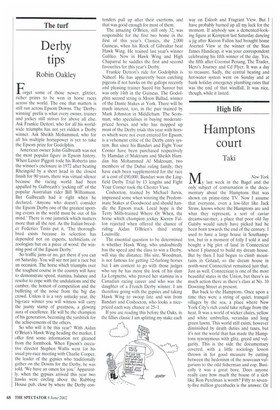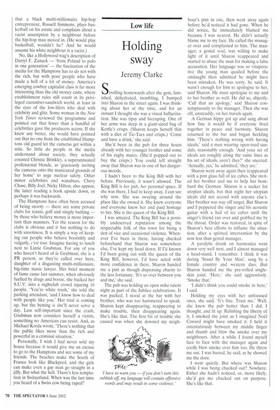High life
Hamptons court
Taki
MNew York y last week in the Bagel and the only subject of conversation is the documentary about the Hamptons that was shown on prime-time TV. Now I assume that everyone, even a low-lifer like Jack Straw, knows where the Hamptons are and what they represent, a sort of caviar dreams-sur-mer, a place that poor old Jay Gatsby would surely have picked had he been born towards the end of the century. I used to have a large house in Southampton, but in a moment of folly I sold it and bought a big plot of land in Connecticut where I planned to build my dream house. But by then I had begun to climb mountains in Gstaad, so the dream house in north-west Connecticut remained just that. Just as well, Connecticut is one of the most beautiful states in the Union, but there's as much action there as there's class at No. 10 Downing Street at present.
But back to the Hamptons. Once upon a time they were a string of quiet, tranquil villages by the sea, a place where New York City's rich could take refuge from the heat. It was a world of wicker chairs, yellow and white umbrellas, verandas and long green lawns. This world still exists, however diminished by death duties and taxes, but it's not the world that has made the Hamptons synonymous with glitz, greed and vulgarity. This is the side the documentary covered, with a little sociology lesson thrown in for good measure by cutting between the hedonism of the nouveaux vulgarians to the odd fisherman and cop. Basically it was a great bore. Does anyone really care how much the house of a slob like Ron Perelman is worth? Fifty to seventy-five million greenbacks is the answer. Or
that a black multi-millionaire hip-hop entrepreneur, Russell Simmons, plays basketball on his estate and complains about a racist assumption by a neighbour before the hip-hop man moved in. (He would play basketball, wouldn't he? And he would assume his white neighbour is a racist.)
No, like a Hollywood wag's description of Darryl F. Zanuck — 'from Poland to polo in one generation' — the fascination of the media for the Hamptons has to do not with the rich, but with poor people who have made a hell of a lot of money. America's emerging cowboy capitalist class is far more interesting than the old money caste, where establishment rules still count in its privileged cucumber-sandwich world, at least in the eyes of the low-lifers who deal with celebrity and glitz. Some woman in the New York Times reviewed the programme and pointed out that fewer than a handful of celebrities gave the producers access. If she knew any better, she would have pointed out that no one from the established Hamptons old guard let the cameras get within a mile. So little do people in the media understand about society, they actually counted Christie Brinkley, a superannuated professional blonde, as 'graciously inviting the cameras onto the manicured grounds of her home' to urge nuclear safety. Other minor celebrities and wanabees, Chevy Chase, Billy Joel, Nicky Hilton, also appear, the latter reading a book upside down, or perhaps it was backwards.
The Hamptons have often been accused of being snooty — there are some private clubs for tennis, golf and simply bathing — by those who believe money is more important than manners. Yet the reason for the clubs is obvious and it has nothing to do with snootiness. It is simply a way of keeping out people who behave boorishly and vulgarly, c'est tout. Imagine having to lunch next to Lizzie Grubman. For any of you who haven't heard of la Grubman, she is a PR person, as they're called over here, daughter of a disgusting multi-millionaire, big-time music lawyer. Her brief moment of fame came last summer, when obviously fuelled by drugs and booze, she backed her S.U.V. into a nightclub crowd injuring 16 people. 'You're white trash,' she told the parking attendant, 'and I know how to deal with people like you.' Her trial is coming up, but the betting is she'll never serve a day. Less self-important since the crash, Grubman now considers herself a victim, something no American can resist. And, as Michael Korda wrote, 'There's nothing that the public likes more than the rich and powerful in a criminal situation.'
Personally, I wish I had never sold my house because it would give me an excuse to go to the Hamptons and see some of my friends. The beaches make the South of France look like Blackpool, and the girls can make even a gay man go straight in a jiffy. But what the hell. There's less temptation in Switzerland. When was the last time you heard of a Swiss cow being raped?























































































 Previous page
Previous page